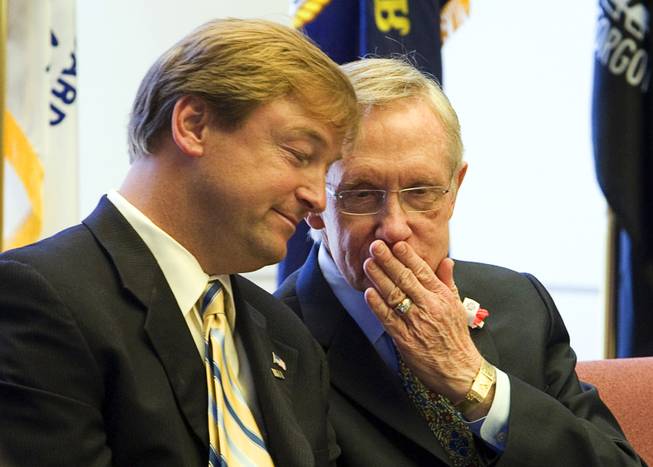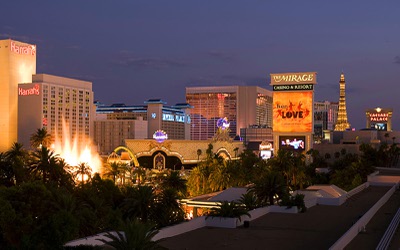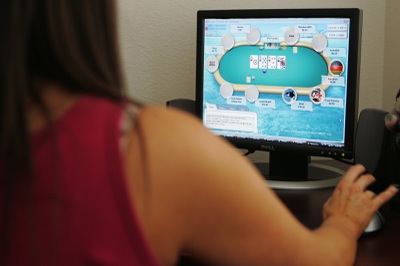
Sen. Harry Reid whispers to Sen. Dean Heller during a Memorial Day ceremony at the Southern Nevada Veterans Memorial Cemetery in Boulder City on Monday, May 30, 2011.
Wednesday, Aug. 1, 2012 | 2 a.m.
Sun coverage
- Nevada considering some of lowest online gaming licensing fees in U.S. (06-15-2012)
- Las Vegas firm buying online poker operator (03-05-2012)
- Lawmakers pushing for federal Internet poker law under pressure to act (01-13-2012)
- Will Adelson’s deep pockets influence the push to legalize online gaming? (06-28-2012)
- Adelson puts damper on efforts to legalize Internet gambling (12-11-2011)
- Timing, legal woes make legalizing online poker less attractive (10-10-2011)
- Nevada politicians key to U.S. push for Internet gaming (04-15-2011)
- More Sun political news
- More Sun gaming news
Each time Congress promises to consider online poker, the subject ends up getting pushed back into yet another overcrowded, end-of-the-year, lame-duck session. And each time that happens, Nevada’s gaming industry becomes increasingly nervous.
“There has to be some action,” said Tom Breitling, chairman of Ultimate Gaming, an online gaming company launched by the owners of Station Casinos. “The debate is not about the legalizing of Internet poker. It’s about the survival of the industry that is the foundation of our economy.”
There are still months to go on the congressional calendar, but the gaming industry is starting to make the sort of last-ditch pitches usually reserved for the waning weeks of December in the hopes of drumming up some attention before the 2012 elections.
Their latest concerted effort is to press Nevada Sens. Harry Reid and Dean Heller to persuade their colleagues to stick online poker into a piece of legislation to enhance the nation’s cybersecurity. That bill is set to go to a vote this week, but its fate is uncertain.
Moreover, the chances of marrying it with a gaming measure appear nil. While Reid supported cybersecurity as a potential vehicle for the gaming change, Heller always thought the bill was too “flawed” and “contentious” to be appropriate.
That has only highlighted an awkward interplay between the two senators, who are bitterly divided over Nevada’s 2012 Senate race but forced to work together to bring home the ultimate bacon: An Internet poker bill to help Nevada’s struggling gaming sector.
Their strange partnership is riddled with political darts.
“The only way we can get (an online poker bill) done is we need Republican votes, and we haven’t gotten them yet,” Reid said Tuesday.
“I’m limited in what I can do with Republicans. I’d like a little help from my Republican colleague,” he added in a thinly veiled reference to Heller.
That climate is only proving frustrating for Nevada’s gaming moguls, who are also watching the clock.
“Quite frankly, we don’t care whose job it is to get the votes. We have a majority leader and a senator, and we need leadership from both,” said one gaming operative. “They need to quit pointing fingers and figure out how to get it done. Not getting it done puts Nevada in real danger.”
The problem isn’t with online poker, per se. Nevada companies — with strong brand recognition and giant customer bases — are well-positioned to compete in both a national online poker market and individual state markets.
The risk is to Nevada’s brick-and-mortar casinos, if Congress doesn’t halt a recent Department of Justice interpretation that all forms of online gambling, save for sports betting, are permitted under the Wire Act. That DOJ letter, released late last year, changed the debate from simply legalizing online poker to outlawing all forms of online gambling except online poker.
Some senators embrace virtually unlimited online gaming short of sports gambling because of the revenue that would be generated for their states, and some oppose gambling altogether. Nevada’s senators want a law that allows only online poker, which Las Vegas casinos are poised to offer, while not allowing other forms of gambling that, if offered, could dilute the desire of gamblers to visit Nevada.
If the federal government does nothing, states could move on their own, and some are anxious to enter the Internet gambling arena. Illinois now sells lottery tickets online, and lawmakers are anxious to pass legislation turning the state into an “Internet gambling hub,” according to the Chicago Tribune.
Iowa, California, New Jersey and Washington, D.C., are also considering online gambling legislation beyond just poker.
And they’re aimed directly at Las Vegas’ customers.
“If you’re a Nevadan, you should be terrified that a massive expansion is going to, over time, completely erode the Nevada gaming market, the brick-and-mortar businesses,” said Jan Jones, vice president of government affairs for Caesars Entertainment, which is lobbying hard for legislation that would outlaw all forms of online gambling except online poker.
“Really, the failure to limit house-backed gaming online is a disaster for the tourist-based Nevada economy,” she said. “If nothing is done, our state’s core industry runs a risk of experiencing a similar fate as Borders Books.”
Borders Books, a chain megabookstore with outlets all over the world, was forced to declare bankruptcy in 2011 because of lost market share to online retailers like Amazon.com.
Breitling described the proliferation of traditional, house-backed gambling games online as the biggest threat to Nevada’s economy since the proposed nuclear waste dump at Yucca Mountain.
And the political strategy to address it is complicated.
Online poker, like Yucca Mountain or immigration, is a policy issue that does not cleave neatly along party lines. As of last week, Reid only has 40-something Democrats on board with the idea of legalizing poker, according to a Senate Democratic source, which means it will take anywhere from 10 to 20 Republicans to carry it across the finish line.
If that’s the case, they’ve got a long way to go.
Various gaming sources count only two Republican senators — Heller and Arizona’s Jon Kyl, who has been working closely with Reid for the past two years — as definite "yes" votes for an Internet poker bill.
An undated list recently published on a poker forum cites eight more as definite "no" votes.
The Las Vegas Sun conducted an unscientific poll of about 20 of the remaining Republicans, sampling from both moderates and conservatives, that revealed most have not made up their minds about poker and that one — Rand Paul of Kentucky — is likely to support an online poker bill. But many Republican undecideds were clearly leaning toward "no."
"I generally have opposed gambling across the board in all forms. So though I have not seen the bill, I probably would oppose it," said Sen. Mike Crapo of Idaho, listed as undecided in the poker community’s survey.
"I'm not a big fan of expanding gaming on the Internet, especially for revenue purposes," said Sen. Marco Rubio of Florida.
"Online poker? No, I wouldn’t vote for it," said Sen. James Inhofe of Oklahoma. "I'd vote against it. I don’t like gambling."
Only three senators the Sun approached outside of leadership circles had already been approached by Heller or Kyl to discuss the topic.
"They just broached the subject with me so I know something about it," said Sen. Saxby Chambliss of Georgia. "Other than that one conversation, I don’t have much information at all."
"I have not talked with them," said Sen. Richard Burr of North Carolina, who added that he’s "not necessarily for or against" online poker.
Senate Republican Leader Mitch McConnell would not answer questions Tuesday about whether he plans to use his influence to help push for poker legislation before the election — or whether he believes doing so would help Heller in his race against Reid's protégé, Shelley Berkley, in 2012.
A spokesman for Heller said Tuesday evening that he and Kyl "have been working very hard on this ... [and] the feedback to date has been positive." Heller has said he considers the end of the year to be the ultimate deadline for getting a poker bill through Congress.
But it appears turning positive feedback into votes may take that much time, which is problematic for an industry visibly wringing its hands over the potential fallout for Las Vegas.
"We literally don’t know what’s going to happen," said I. Nelson Rose, a gaming professor at Whittier Law School in Southern California.
No one has conducted a detailed analysis of what the proliferation of online gambling would do to the Las Vegas Strip. On one hand, creating new gamblers online could feed the Las Vegas market with new players who want to jump to the real casino experience.
"But some forms of gambling and some land-based operators, they're going to find themselves in the difficult position of trying to compete against a much more easily available form of gambling [on the Internet]," Rose said.
In that case, online gaming will erode several important feeder markets in a manner similar to what Indian gaming did to the casino industry in Reno in the past decade.
Legalization of Indian gaming in California strangled Reno's base of gamblers. The last major hotel-casino opened in 1995 and is currently undergoing bankruptcy reorganization.
"Reno’s not dead," Reno-based gaming analyst Ken Adams said, dismissing the idea that the Las Vegas Strip would simply collapse. "But the growth is gone."
Halting growth on the Strip would have serious implications for Nevada’s overall economy. Gaming analysts and academics generally agree that if online gambling is widespread, it will force brick-and-mortar companies to find different ways to compete. That could result in a virtual shutdown of large casino construction — a major driver of Nevada's once-booming economy.
"Suddenly, we could have an industry that makes the casino industry almost non-existent," Adams said, pointing to a virtual dry-up in new licenses going to new brick-and-mortar casinos. "I think we’ve crossed a tipping point where the momentum that represented construction like CityCenter, where you had casinos go up one right after the other, is done."
"People who do online gambling don’t want to sit in front of metal boxes with simulated video slot machine reels in giant warehouses," Rose said.
Instead of brick-and mortar-casinos being licensed for online poker, slot machine manufacturers and online game-makers are building enough of a presence to capture the initial opportunities of the new market of online gamblers.
For example, Facebook game-maker Zynga Poker, with a user base of 33.3 million people, appears to be positioning itself for real-money play. Slot machine manufacturer WMS Industries this month opened a subsidiary to run a Facebook-based virtual casino that could potentially transition to real-money games.
That’s not to say Nevada companies aren’t poised for action.
Station Casinos this month launched Ultimate Poker, a free-play site, on Facebook. Caesars, MGM Resorts and Boyd also are positioning themselves for the online poker market. The Nevada Gaming Commission has issued online betting licenses to Bally Technologies, International Game Technology and Shuffle Master.
Gaming Control Board Chairman Mark Lipparelli last week told reporters that casino operators will likely be before the board for online poker licenses within two months.
Despite the real threat posed by online gambling to brick-and-mortar casinos, Adams cautioned against the-sky-is-falling scenarios, pointing out that Las Vegas’ casino industry will be insulated to some extent by the fact that Vegas is Vegas.
"The Las Vegas Strip has too much energy and too much stuff for it to dry up and blow away," he said. "With 125,000 hotel rooms, you have the potential of 250,000 people walking around Vegas drooling and staring and lusting after all of the glitz.
"You can’t buy that online."



Join the Discussion:
Check this out for a full explanation of our conversion to the LiveFyre commenting system and instructions on how to sign up for an account.
Full comments policy